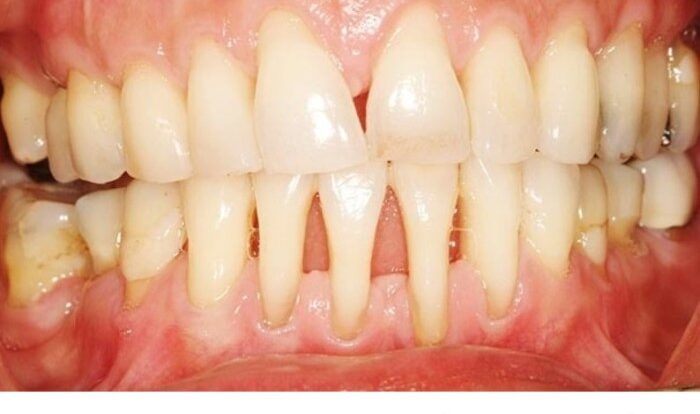
How to cure gum disease without a dentist – If you’re looking for ways to cure gum disease without resorting to a dentist, you’ve come to the right place. This guide will explore a range of natural and home remedies that can help you combat gum disease effectively.
From salt water rinses to tea tree oil and turmeric, we’ll delve into the effectiveness of these remedies and provide detailed instructions on how to use them. We’ll also cover lifestyle modifications, prevention techniques, and alternative therapies that can support your gum health.
Natural Remedies for Gum Disease

Gum disease, a common dental issue, arises from bacterial plaque accumulating on the teeth. This plaque, if not removed, hardens into tartar, leading to inflammation and potential damage to the gums and supporting bone structure. While visiting a dentist is crucial for professional treatment, several natural remedies can effectively combat gum disease symptoms.
Looking for an easy way to cure gum disease without a dentist ? There are a few simple steps you can follow to get rid of gum disease without having to go to the dentist. First, you’ll need to brush your teeth twice a day with a soft-bristled toothbrush.
Next, you’ll need to floss your teeth once a day. Finally, you’ll need to rinse your mouth with a mouthwash that contains fluoride. If you follow these steps, you’ll be able to cure gum disease without a dentist.
Salt Water Rinses
Salt water rinses possess antibacterial and anti-inflammatory properties, making them a simple yet effective remedy for gum disease. The salt helps reduce inflammation and pain while inhibiting bacterial growth. To prepare a salt water rinse, dissolve half a teaspoon of salt in a cup of warm water.
Rinse your mouth thoroughly for 30 seconds, ensuring the solution reaches all affected areas. Repeat this process several times a day for optimal results.
Tea Tree Oil
Tea tree oil, extracted from the leaves of the Melaleuca alternifolia tree, exhibits potent antibacterial and antifungal properties. It effectively combats the bacteria responsible for gum disease, reducing inflammation and promoting healing. To use tea tree oil, mix a few drops with a carrier oil, such as coconut or olive oil, and apply it directly to the affected gums using a cotton swab.
Leave it on for a few minutes before rinsing your mouth thoroughly. Repeat this process twice daily for best results.
Turmeric
Turmeric, a spice commonly used in traditional medicine, contains curcumin, a compound with powerful anti-inflammatory and antioxidant properties. Curcumin has been shown to inhibit the growth of bacteria associated with gum disease and reduce inflammation in the gums. To incorporate turmeric into your oral hygiene routine, mix a teaspoon of turmeric powder with a little water to form a paste.
Gum disease can be a pain, but it doesn’t have to be a hassle to treat. With the right tools and techniques, you can cure gum disease without ever stepping foot in a dentist’s office. Check out how to cure gum disease without a dentist to learn more about how you can get your gums back in tip-top shape.
Apply this paste to your gums and leave it on for a few minutes before rinsing your mouth thoroughly. Repeat this process once or twice daily for effective results.
You can take care of gum disease without visiting a dentist. Start by brushing twice daily with a soft-bristled toothbrush. For deeper cleaning, floss at least once a day. You can also try how to cure gum disease without a dentist to prevent further damage to your gums.
Home Remedies for Gum Disease
Alongside the natural remedies we’ve discussed, there are various home remedies that can effectively alleviate gum disease symptoms and promote oral health. Here are some widely recommended techniques:
Oil Pulling with Coconut Oil
Oil pulling, a traditional Ayurvedic practice, involves swishing a tablespoon of coconut oil in the mouth for 10-15 minutes. This action helps draw out toxins and bacteria from the gums and teeth. Coconut oil, rich in lauric acid, possesses antibacterial and anti-inflammatory properties, making it an ideal choice for gum health.
Baking Soda
Baking soda neutralizes acids and reduces inflammation in the gums. To use it, create a paste by mixing a teaspoon of baking soda with a little water. Apply the paste to the gums using a cotton swab or your finger, gently massaging it for a few minutes before rinsing with water.
Repeat this process twice daily for optimal results.
Homemade Mouthwash with Essential Oils
Certain essential oils have potent antibacterial properties that can combat gum disease. To make a homemade mouthwash, combine 10 drops of tea tree oil, 5 drops of peppermint oil, and 5 drops of lemon oil in a cup of warm water.
Gargle with this solution for 30 seconds twice a day, ensuring you swish it around your gums thoroughly.
Lifestyle Modifications for Gum Disease
Gum disease, also known as periodontal disease, is a common condition that affects the gums and supporting structures of the teeth. It can lead to inflammation, bleeding, and even tooth loss if left untreated. While there are many treatments available for gum disease, some lifestyle modifications can also help to improve gum health and reduce the risk of developing the condition.
If you’re struggling with gum disease and don’t have the time or resources to see a dentist, there are some home remedies you can try. One option is to visit Fresno Mecconline for a wealth of information on natural remedies.
They have a great article on how to cure gum disease without a dentist that provides step-by-step instructions and helpful tips. Once you’ve explored their site, continue researching and experimenting with different treatments to find what works best for you.
Quitting Smoking
Smoking is one of the worst things you can do for your oral health. It damages the gums and other tissues in the mouth, making them more susceptible to infection. Quitting smoking is one of the best things you can do to improve your gum health and overall health.
Healthy Diet
Eating a healthy diet is important for overall health, including oral health. Fruits and vegetables are high in antioxidants, which can help to reduce inflammation and protect the gums from damage. Dairy products are also good for gum health, as they contain calcium and other nutrients that help to strengthen the teeth and bones.
Good Oral Hygiene
Good oral hygiene is essential for preventing gum disease. Brushing your teeth twice a day and flossing once a day helps to remove plaque and bacteria from the teeth and gums. It is also important to see your dentist regularly for checkups and cleanings.
Prevention of Gum Disease
Gum disease, also known as periodontal disease, is a common condition that can damage the gums and supporting structures of the teeth. It is caused by bacteria that form plaque on the teeth, and if left untreated, it can lead to tooth loss.
There are a number of things you can do to prevent gum disease, including:
- Brushing and flossing regularly:This is the most important thing you can do to prevent gum disease. Brush your teeth twice a day with a soft-bristled toothbrush and fluoride toothpaste. Floss once a day to remove plaque and bacteria from between your teeth.
- Eating a healthy diet:A healthy diet is important for overall health, including oral health. Eating plenty of fruits, vegetables, and whole grains can help to keep your gums healthy.
- Avoiding tobacco products:Smoking and chewing tobacco can damage the gums and make them more susceptible to infection.
- Getting regular dental checkups:Regular dental checkups are important for detecting and treating gum disease early on. Your dentist can clean your teeth, check for signs of gum disease, and recommend treatment options if necessary.
Risk Factors for Gum Disease
There are a number of risk factors that can increase your chances of developing gum disease, including:
- Poor oral hygiene:Not brushing and flossing your teeth regularly can lead to plaque buildup, which can cause gum disease.
- Dry mouth:Dry mouth can reduce the amount of saliva in your mouth, which can help to protect your teeth and gums from bacteria.
- Diabetes:People with diabetes are more likely to develop gum disease because high blood sugar levels can damage the blood vessels that supply the gums.
- Certain medications:Some medications, such as steroids and chemotherapy drugs, can cause gum disease as a side effect.
- Genetics:Some people are more likely to develop gum disease than others due to their genes.
Proper Brushing and Flossing Techniques
To properly brush your teeth, follow these steps:
- Use a soft-bristled toothbrush and fluoride toothpaste.
- Brush your teeth for at least two minutes, twice a day.
- Be sure to brush all surfaces of your teeth, including the front, back, and chewing surfaces.
- Use a gentle circular motion when brushing.
- Rinse your mouth with water after brushing.
To properly floss your teeth, follow these steps:
- Use about 18 inches of floss.
- Wrap the floss around your middle fingers.
- Gently slide the floss between your teeth.
- Move the floss up and down along the sides of your teeth.
- Be sure to floss under the gum line.
- Rinse your mouth with water after flossing.
Regular Dental Checkups
Regular dental checkups are important for detecting and treating gum disease early on. Your dentist can clean your teeth, check for signs of gum disease, and recommend treatment options if necessary.It is recommended to see your dentist for a checkup every six months.
If you have any signs of gum disease, such as bleeding gums, swelling, or pain, you should see your dentist sooner.
Alternative Therapies for Gum Disease

Alternative therapies offer additional approaches to manage gum disease symptoms and improve oral health. These therapies complement traditional dental care and may provide additional benefits in reducing inflammation, boosting immunity, and promoting overall well-being.
Acupuncture
Acupuncture involves the insertion of thin needles into specific points on the body to stimulate the body’s natural healing response. It is believed that acupuncture can help reduce gum inflammation by promoting blood flow and releasing endorphins, which have pain-relieving effects.
Gum disease can be a pain, but you don’t always need to see a dentist to treat it. There are plenty of natural remedies you can try at home. This article has some great tips on how to cure gum disease without a dentist, like using salt water rinses or applying tea tree oil to your gums.
You can also try taking probiotics or eating foods that are high in vitamin C. With a little effort, you can get rid of gum disease for good.
Studies have shown that acupuncture may be effective in improving gum health and reducing the need for invasive treatments.
Herbal Supplements
Certain herbal supplements have been traditionally used to support gum health. Echinacea, for example, is known for its immune-boosting properties and may help fight bacterial infections that contribute to gum disease. Other herbs, such as chamomile and sage, have anti-inflammatory properties that can help soothe gum irritation and reduce pain.
Yoga and Meditation, How to cure gum disease without a dentist
Stress can exacerbate gum disease by weakening the immune system and increasing inflammation. Yoga and meditation are effective stress-reduction techniques that can help improve overall health and well-being, including gum health. These practices promote relaxation, reduce stress hormones, and improve blood flow, which can contribute to a healthier gum environment.
Closing Summary: How To Cure Gum Disease Without A Dentist
By incorporating these natural and home remedies into your routine, you can improve your gum health, reduce inflammation, and prevent further damage. Remember to consult with a healthcare professional if your symptoms persist or worsen.
FAQ Compilation
Can I cure gum disease completely without a dentist?
While some natural and home remedies can improve gum health, it’s essential to consult with a dentist for a proper diagnosis and treatment plan. Gum disease can be a complex condition that may require professional intervention.
How often should I use salt water rinses for gum disease?
Rinsing with salt water can be done 2-3 times a day. It’s important to use warm water and dissolve about half a teaspoon of salt in each rinse.
Can tea tree oil be swallowed for gum disease?
No, tea tree oil should not be swallowed. It can be toxic if ingested.





